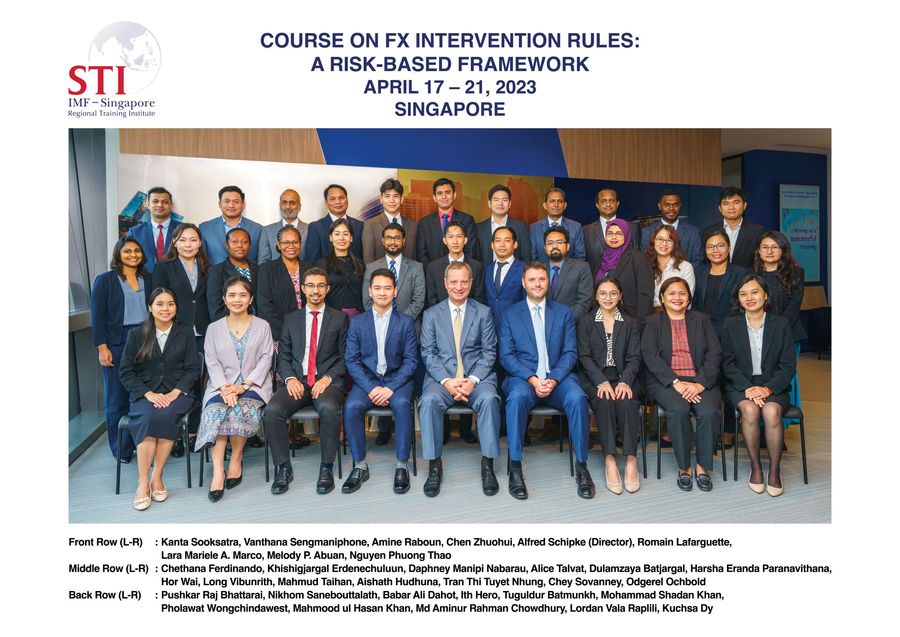IMF - STI: Risk-Based Framework for FX Intervention#
Welcome to the website of the IMF course on FX Interventions Rules, delivered at the Singapore Regional Training Institute
Course on FX Intervention Rules: A Risk-Based Approach (FIRARBF)
Singapore, April 17 – 21, 2023
 Many thanks to the Singapore Training Institute and in particular Alina Tan for the spotless organization!
Many thanks to the Singapore Training Institute and in particular Alina Tan for the spotless organization!
Description#
This five-day course aims to train participants, mostly from central banks, on the theoretical and practical aspects of central bank interventions in foreign exchange markets. The course is organized by the IMF-Singapore Regional Training Institute (STI) and taught by a team of IMF consultants.
The course includes a blend of lectures and workshops covering various topics:
Central banking theory on FX interventions
FX Interventions international practices
Time series econometrics and volatility modeling
Programming under Python
This course also presents the model developped by Lafarguette and Veyrune (2011) on risk-based models for FX interventions. The course is accompanied by a Python package, available on pypi
Overall, the course aims to provide participants with a solid understanding of the theoretical and practical aspects of central bank interventions in foreign exchange markets, along with hands-on experience in using Python and IMF software infrastructure for modeling conditional foreign exchange intervention triggers. The main takeaways for participants include a deeper understanding of FX interventions, statistical concepts, and Python programming. Participants can use this knowledge to improve their skills in their respective roles and advance their careers in the field of finance.
Materials#
The materials of the course consist in slides for the lecture (links below), as well as Python notebooks for practicising programming.
This website contains all the materials taught during the class, as well as extra resources for participants.
We designed a full-fledge Python package for modeling volatility for FX interventions, available on pypi
Team#
Romain Lafarguette, Ph.D.: Buy-side macro-quant at the Abu Dhabi Investment Authority; former IMF economist and ECB market operations expert, IMF External Consultant
Amine Raboun, Ph.D.: Buy-side quant at the Abu Dhabi Investment Authority, IMF External Consultant
Zhuohui Chen: IMF Research Analyst, Monetary and Capital Markets Department
Do not hesitate to contact us (email address available on our personal websites) if you have any question or suggestion.
Program#
Monday, April 17 |
|||
9:00 - 9:15 |
Administrative Briefing |
||
9:15 – 9:45 |
Opening Session |
||
10:00 – 11:30 |
L-1 |
Central Bank Interventions: Theory (lecture) |
|
11:30 – 12:30 |
L-2 |
Central Bank Interventions: International Practices (lecture) |
|
14:00 – 15:15 |
L-3 |
General Introduction to Python (lecture) |
|
15:30 – 17:30 |
W-2 |
Data Manipulation and Visualization with Python (workshop) |
|
Tuesday, April 18 |
|||
9:00 – 10:30 |
L–4 |
Introduction to Key Statistical Concepts (lecture) |
|
10:45 – 12:30 |
W-3 |
Statistical Analysis with Python (workshop) |
|
14:00 – 15:15 |
L–5 |
Time Series Econometrics (lecture) |
|
15:30 – 17:30 |
W-4 |
Time Series Econometrics with Python (workshop) |
|
Wednesday, April 19 |
|||
9:00 – 10:30 |
L–6 |
Forecast Volatility and Value at Risk Modeling (lecture) |
|
10:45 – 12:30 |
W-5 |
Advanced Volatility Modeling with Python (workshop) |
|
14:00– 15:15 |
L–7 |
Advanced Techniques for Model Evaluation, Selection and Combination (lecture) |
|
15:30 – 17:30 |
W-6 |
Model evaluation and interpretation with Python (workshop) |
|
Thursday, April 20 |
|||
9:00 – 10:30 |
L–8 |
IMF Risk Based Model for Foreign Exchange intervention (lecture) |
|
10:45 – 12:30 |
W–7 |
Introduction to the IMF Software Infrastructure for Modelling Conditional Foreign Exchange intervention Triggers (workshop) |
|
14:00 – 17:30 |
W–8 |
Application of the IMF Software Infrastructure on Case Study and Preparation for the Presentations (Breakout) |
|
Friday, April 21 |
|||
9:00 – 11:00 |
W–9 |
Participants’ Presentations on Case Studies (Plenary) |
|
11:00 – 11:30 |
End-of-Course Survey |
||
11:30 – 12:30 |
Closing Session and Presentation of Certificates |
Resources#
A textbook presentation of foreing exchange interventions can be found in Sarno and Taylor (2012): link
The IMF has published a guidance note on FX interventions on the spot and derivatives market (2021): link
The BIS publishes interesting papers reflecting BIS surveys conducted with central banks. For instance (2019): link
A recent and quite comprehensive database on FX Interventions (2021), compiled by IMF colleagues: link
Kathryn Dominguez, professor at U-Michigan, specialized on FX interventions: link
Popper (2022) provides a very complete literature review on FX Interventions: link
Lafarguette and Veyrune (2021) who present a risk-based framework for FX interventions: link
General useful resource: the IMF Glossary link
Misc#
We are grateful to Thomas Schmelzer, a colleague at ADIA’s Quant team, for his suggestion of using a Jupyter book for building our website.
